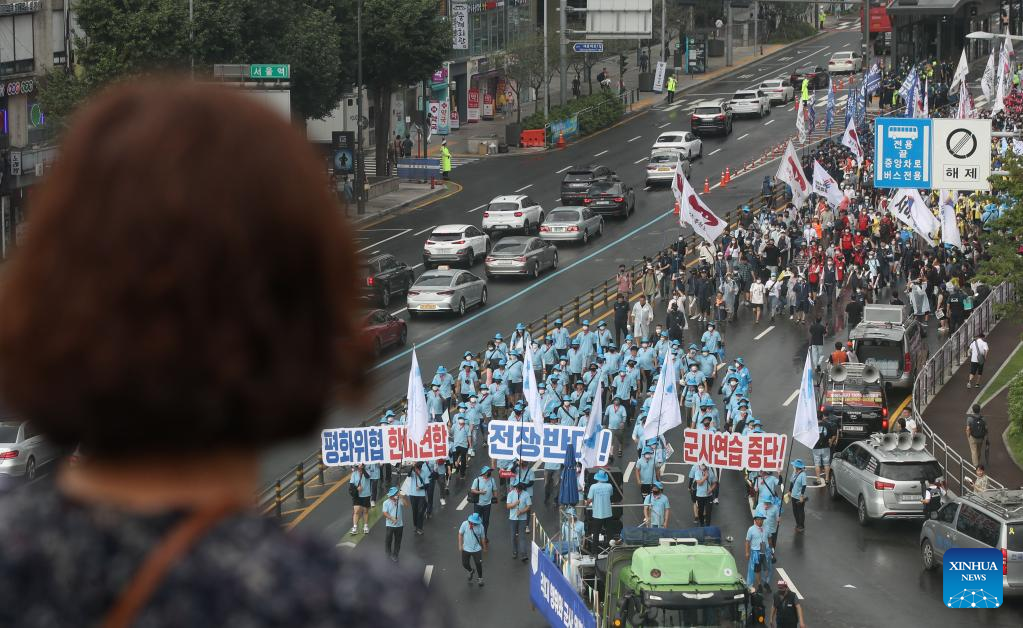
Protesters in Seoul demand withdrawal of U.S. troops from South Korea
During his trip to the Indo-Pacific in May, U.S. President Joe Biden made his first stop in South Korea where he hoped to inaugurate a new golden era of U.S.-South Korean relations.
South Korea’s newly elected President Yoon Suk-yeol was a conservative who had promised a tough stance against North Korea. A RAND Corporation analyst heralded him as “Biden’s perfect South Korean partner.”
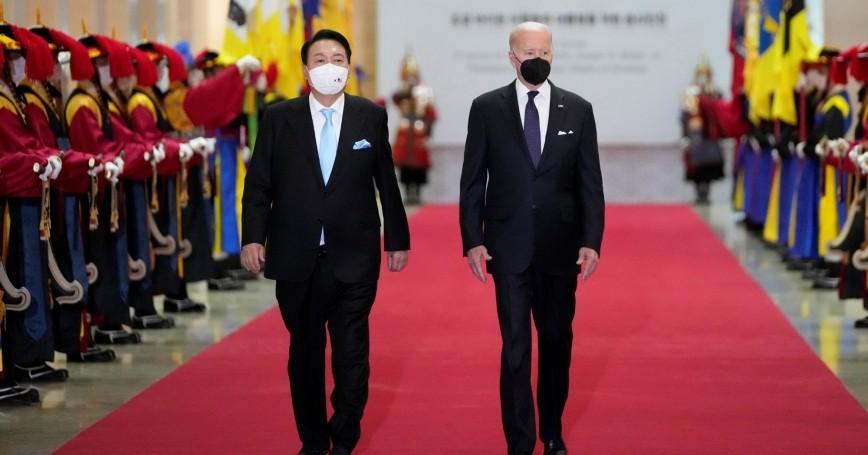
The U.S. has maintained tens of thousands of soldiers in South Korea since the Korean War ended in 1953 with an armistice, not a peace treaty, and established 15 military bases there.
During their meeting, Biden and Yoon agreed to “expand the scope and scale” of combined military exercises and training, and discussed the possibility of deploying strategic military assets, “fighters, bombers, or missiles,” to South Korea to bolster its deterrence capabilities against North Korea, which had been ruled for the last 75 years by the socialist Kim dynasty.
Neither Biden nor Yoon, however, factored into their plans the large-scale protests which broke out on August 13 in Seoul in reaction to the military exercises, and others that may yet follow.
Named “Ulchi Freedom Shield” after a seventh Century Korean General, the military exercise have involved thousands of troops in live-fire exercises combining land, sea and air forces, and joint mock attacks assisted by drone surveillance.
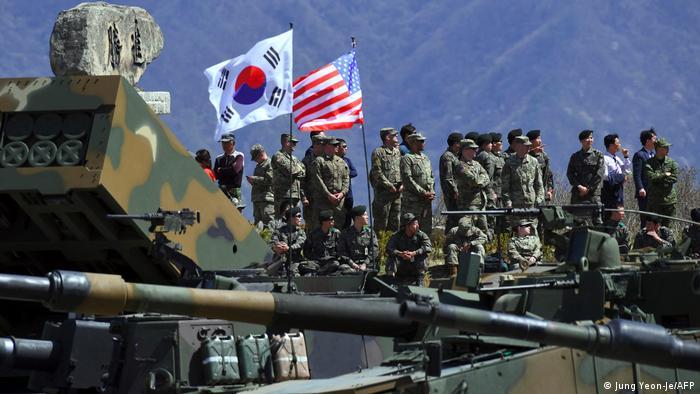
North Korean leader Kim Jong-un denounced these drills as a “dress rehearsal for northward invasion,” while a columnist for a North Korean newspaper wrote: “how could anybody only see a terribly dangerous tumult [since the U.S. and South Korea were] playing with fire at the front door of [North Korea’s] home.”

The drills coincided with rising tensions with China resulting from Nancy Pelosi’s inflammatory visit to Taiwan and the Biden administration’s sending of warships into the Taiwan Strait in violation of international law. Yoon had inflamed China through his decision to add more anti-missile batteries employing the U.S. Terminal High-Altitude Area Defense system, or THAAD, which could be reconfigured to peer into Chinese territory.[1]
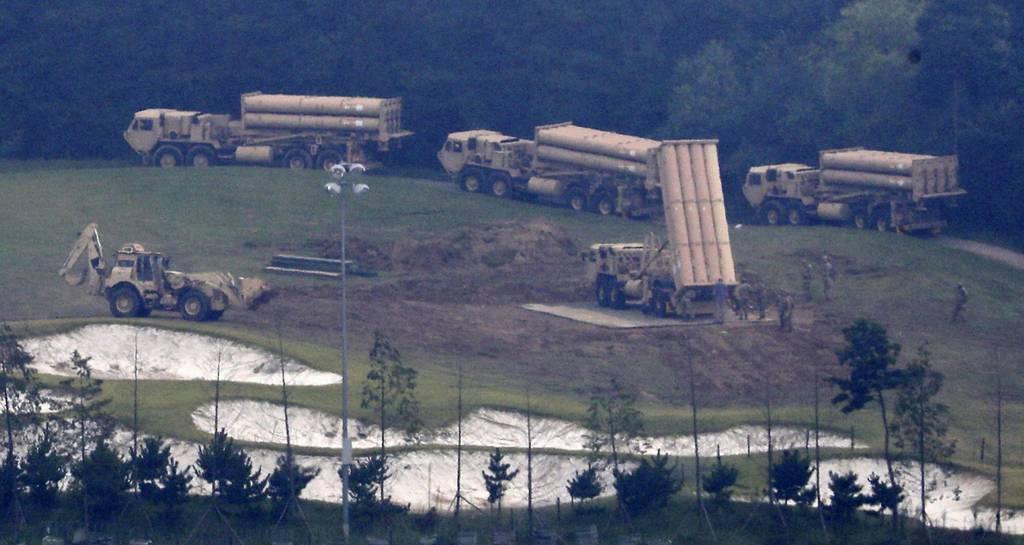
Yoon has also committed South Korea to a closer security relationship with Japan, with Japanese naval units joining the U.S. and South Korea for missile search and tracking exercises off the coast of Hawaii.

Yoon’s predecessor, Moon Jae-in (2017-2022), had tried to repair relations with Beijing by pledging the “Three Nos”—that Seoul would not deploy any additional THAAD systems; would not participate in U.S.-led missile defense networks; and would not form a trilateral military alliance with Washington and Tokyo.
During Donald Trump’s presidency, regular U.S.-South Korea drills were suspended. Trump and Moon held talks with North Korean leader Kim Jong-un and drew down military cooperation as a sign of goodwill toward Pyongyang.
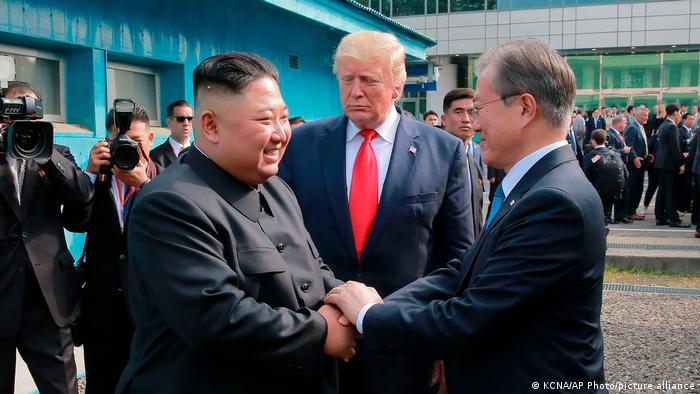
In a sign of today’s worsening relations, North Korea responded to the “Ulchi Freedom Shield” drills by launching two cruise missiles into the Sea of Japan.
“No War Rehearsal”
The August 13 protests in Seoul were timed to coincide with National Liberation Day, celebrating the 77th anniversary of the Korean Peninsula’s liberation from Imperial Japan’s 1910-45 colonial rule.
Participants took to the streets and chanted anti-U.S. slogans, shouting “Dissolve [South] Korea-U.S. alliance” and “This land is not a U.S. war base.”
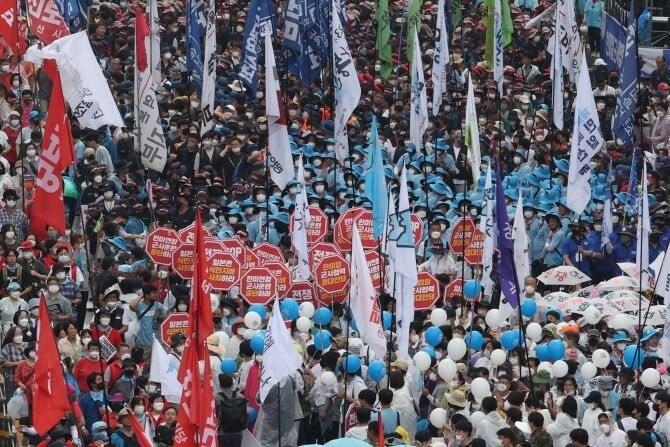
Placards at the rally read “No war rehearsal, No U.S.” and “No [South] Korea-U.S.-Japan military cooperation.”
Yang Kyung-soo, chief of the Korean Confederation of Trade Unions (KCTU), said at the protest rally that staging military exercises in preparation for a war is “tantamount to intending to wage a war,” according to local newspaper Chosun Ilbo.
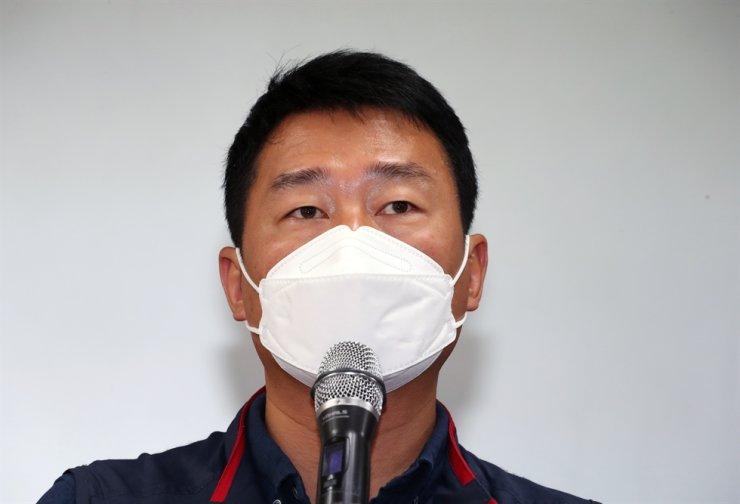
That newspaper reported that some of the KCTU members had carried out anti-U.S. demonstrations earlier in the month near U.S. military bases across South Korea, demanding the withdrawal of U.S. troops from the country.
In late June, civic groups carried out civil disobedience in front of the Jeju-do island Naval Base demanding a halt to maritime war drills and closure of the base—which was built on a pristine World Heritage Site.
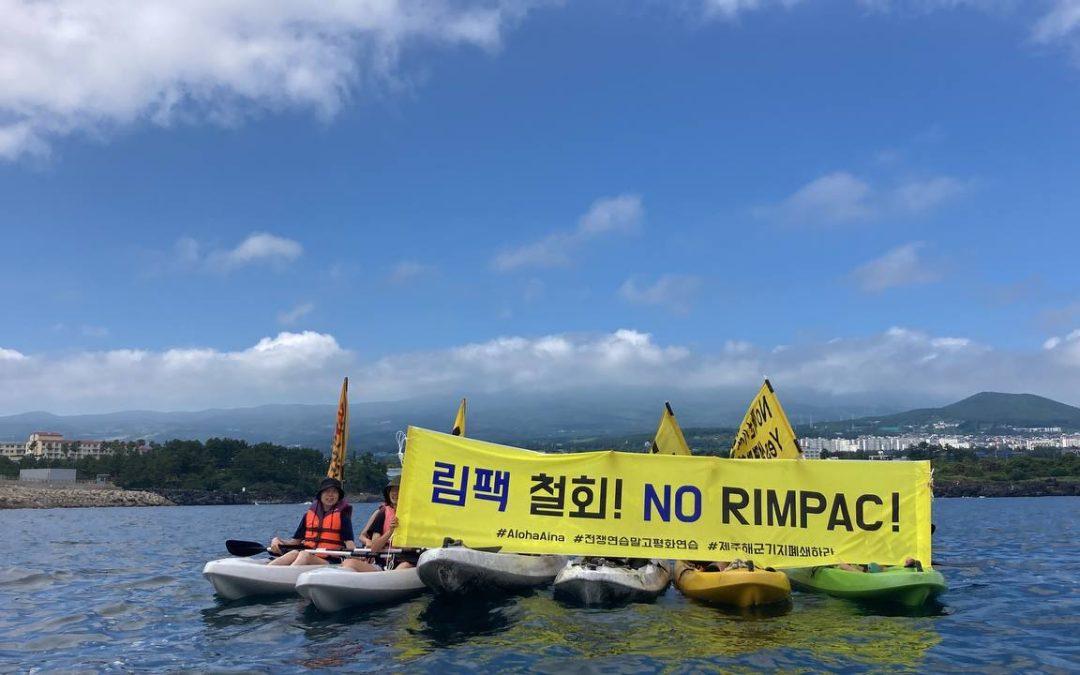
Jeju-do island was the site of a horrific series of massacres by U.S. and South Korean troops on the eve of the Korean War.
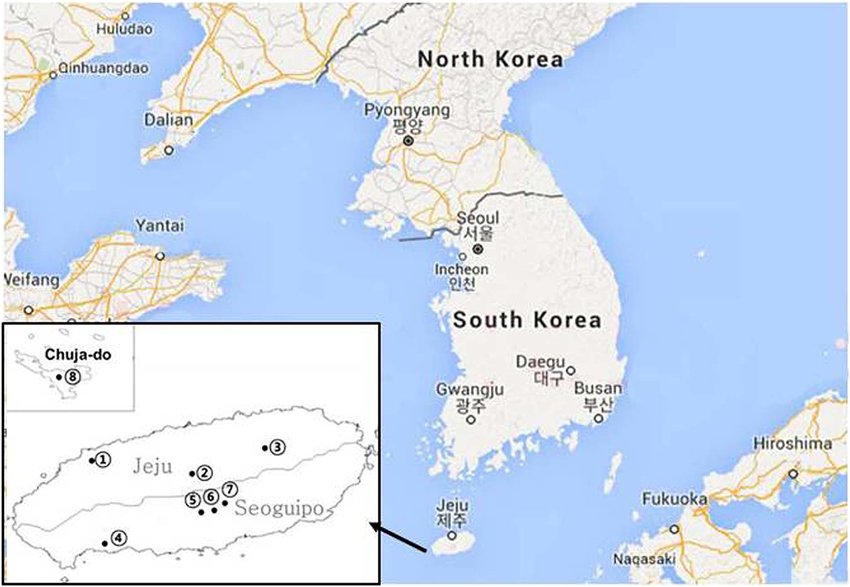
Peace activist Choi Sung-hee wrote that the protests in Jeju-do in late June were more than just opposition to a particular military exercise; they were part of a “struggle against the preparations for war in Northeast Asia and the wholesale militarization of the ocean, earth, sky, and space.”
This is equally true of the August 13 protests, which might initiate a tidal wave that sets back Biden and Yoon’s militarist designs.

-
Beijing retaliated by suspending Chinese group tours to South Korea and obliterating the China business of South Korean supermarket giant Lotte, which had provided land for the missile system. ↑
CovertAction Magazine is made possible by subscriptions, orders and donations from readers like you.
Blow the Whistle on U.S. Imperialism
Click the whistle and donate
When you donate to CovertAction Magazine, you are supporting investigative journalism. Your contributions go directly to supporting the development, production, editing, and dissemination of the Magazine.
CovertAction Magazine does not receive corporate or government sponsorship. Yet, we hold a steadfast commitment to providing compensation for writers, editorial and technical support. Your support helps facilitate this compensation as well as increase the caliber of this work.
Please make a donation by clicking on the donate logo above and enter the amount and your credit or debit card information.
CovertAction Institute, Inc. (CAI) is a 501(c)(3) non-profit organization and your gift is tax-deductible for federal income purposes. CAI’s tax-exempt ID number is 87-2461683.
We sincerely thank you for your support.
Disclaimer: The contents of this article are the sole responsibility of the author(s). CovertAction Institute, Inc. (CAI), including its Board of Directors (BD), Editorial Board (EB), Advisory Board (AB), staff, volunteers and its projects (including CovertAction Magazine) are not responsible for any inaccurate or incorrect statement in this article. This article also does not necessarily represent the views the BD, the EB, the AB, staff, volunteers, or any members of its projects.
Differing viewpoints: CAM publishes articles with differing viewpoints in an effort to nurture vibrant debate and thoughtful critical analysis. Feel free to comment on the articles in the comment section and/or send your letters to the Editors, which we will publish in the Letters column.
Copyrighted Material: This web site may contain copyrighted material the use of which has not always been specifically authorized by the copyright owner. As a not-for-profit charitable organization incorporated in the State of New York, we are making such material available in an effort to advance the understanding of humanity’s problems and hopefully to help find solutions for those problems. We believe this constitutes a ‘fair use’ of any such copyrighted material as provided for in section 107 of the US Copyright Law. You can read more about ‘fair use’ and US Copyright Law at the Legal Information Institute of Cornell Law School.
Republishing: CovertAction Magazine (CAM) grants permission to cross-post CAM articles on not-for-profit community internet sites as long as the source is acknowledged together with a hyperlink to the original CovertAction Magazine article. Also, kindly let us know at info@CovertActionMagazine.com. For publication of CAM articles in print or other forms including commercial internet sites, contact: info@CovertActionMagazine.com.
By using this site, you agree to these terms above.
About the Author

Jeremy Kuzmarov holds a Ph.D. in American history from Brandeis University and has taught at numerous colleges across the United States. He is regularly sought out as an expert on U.S. history and politics for radio and TV programs and co-hosts a radio show on New York Public Radio and on Progressive Radio News Network called “Uncontrolled Opposition.”
He is Managing Editor of CovertAction Magazine and is the author of six books on U.S. foreign policy, including Obama’s Unending Wars (Clarity Press, 2019), The Russians Are Coming, Again, with John Marciano (Monthly Review Press, 2018), Warmonger. How Clinton’s Malign Foreign Policy Launched the U.S. Trajectory From Bush II to Biden (Clarity Press, 2023); and with Dan Kovalik, Syria: Anatomy of Regime Change (Baraka Books, 2025).
Besides these books, Kuzmarov has published hundreds of articles and contributed to numerous edited volumes, including one in the prestigious Oxford History of Counterinsurgency .
He can be reached at jkuzmarov2@gmail.com and found on substack here.

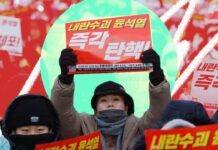
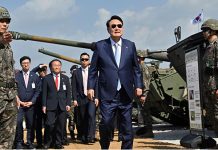


[…] Protests Threaten Biden Administration’s Plans for a New Golden Era in U.S.-South Korean Relations… […]
The US brought the war to Europe, why not to South Korea